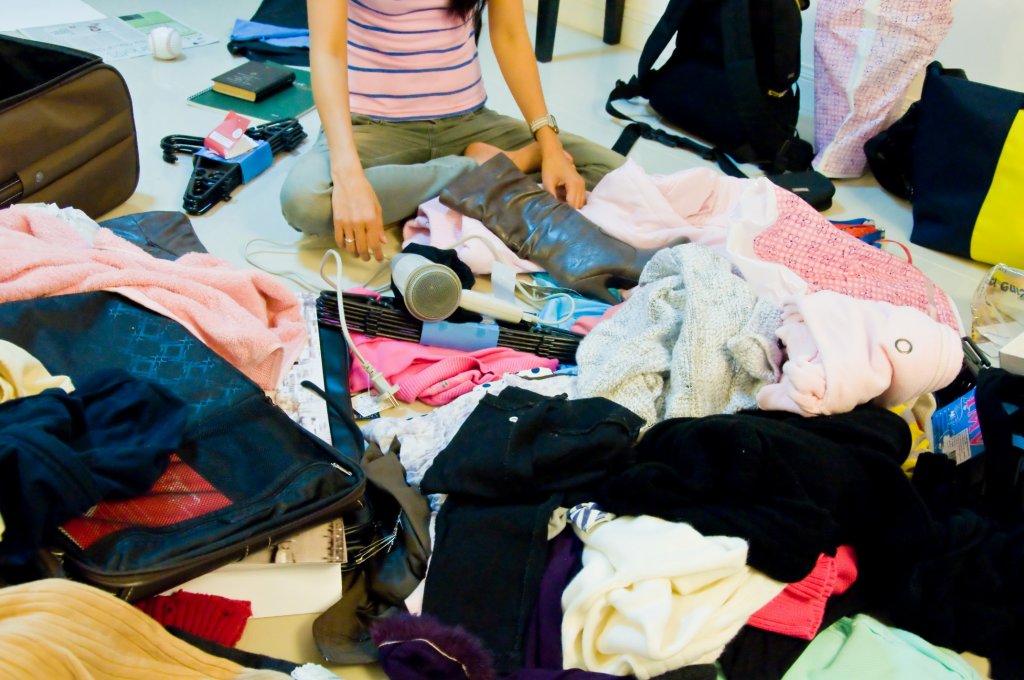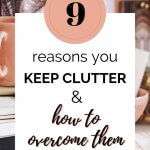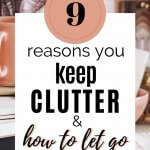Inside: Learn the common reasons for clutter and how to overcome them and let go of the excess.
What stands between you and your beautifully simplified life? Clutter.
Why we hang onto it varies from person to person. However, some answers I see repeated often so let’s talk about the reasons you keep clutter and how to overcome them.
I have to start by saying that everyone is going to have a different definition of what clutter is.
The three questions I use to help figure out what clutter is are 1. do you use it? 2. do you love it? 3. do you want it to be part of your life going forward?
Now that we know how to define clutter, we can move on to reasons you keep clutter.

Reasons You Keep Clutter and How to Overcome Them:
1. Money spent
I think there are two main reasons why we keep things that we spent a lot of money on. One is that we perceive that the item still holds a high value because we remember what we spent on it. In that instance, it feels wasteful to just let it go.
If you try to sell it, you may believe it is worth more than what the market says it is. Resale for most everything is significantly lower than retail.
Depending on the item, it may not be worth your time and effort to try and get any money back out of it.
The second reason is guilt for how much money was spent. But here’s the thing. The money is already gone. There is no going back or undoing it.
Holding onto the physical manifestation of past regrets doesn’t benefit you in any way.
Yes, please do learn the lesson so that going forward you don’t find yourself in this same scenario again. Be thoughtful about future purchase choices. But please do not continue to hang onto clutter so that you can remind yourself over and over again of a mistake you made.
Learn the lesson and let go.

2. Guilt
Guilt, in this case, isn’t about the guilt from purchases you have made. We already talked about that one with money. In this instance, I am talking about guilt regarding things that have been gifted to you.
Perhaps you feel bad that someone bought you a gift that was not at all your taste. There are a variety of reasons that the item may not have been a fit for you and has become clutter in your home.
Guilt is a poor motivator for anything. There is no feeling good about doing something when guilt is your driving force.
When you give someone else a gift, would you want them to hold onto it when they don’t want or need it because they feel like they can’t get rid of it? I know I definitely don’t want to burden people that way. And most of the population would likely agree.
Gifts are for the benefit of the receiver. If the item is no longer beneficial for you, then don’t keep it.
If you do happen to have an outlier relative who gives with the motivation of wanting you to feel obligated to keep items to display them when they visit, may I suggest that you not participate in that game?
That is an unkind expectation to put on someone else. Don’t encourage or enable that behavior. Don’t let guilt drive the bus.

3. Holding onto the past
Holding onto the past is another one of the reasons you keep clutter. I have an entire post dedicated to how to decide what sentimental items to keep. Once you’ve determined what you want to keep, it’s time to let go of what is no longer serving you.
Does that mean you can’t keep anything sentimental? Definitely not. It just means being thoughtful about what you keep and not let your emotions make all of the decisions.
Sometimes holding onto sentimental items is a way to try and hold on to the past. That could be past memories, experiences, or people who are no longer with us.
The memories live on regardless of whether or not we keep every item from along our journey. Choose what is most meaningful and free yourself up from the rest. There is so much freedom to be found in letting go.

4. Not sure how to get rid of clutter
This is something that can definitely stop us in our tracks. It can either be an excuse or a legitimate reason we don’t even start the decluttering process. How to responsibly donate items you no longer want can be a challenge.
Other people may get caught up on trying to sell their clutter, which works for some but isn’t for everyone.
Donating could mean giving it to a neighbor, friend or family member. It could mean listing on your local Buy Nothing group.
Or it could mean finding a local organization you would like to support by giving them your things. For items that cannot be recycled, throw it in the trash.
The most important thing to learn in this process is not the ultimate very best way to get rid of your clutter. It’s great to do that, but the biggest lesson to be learned here is how to prevent this cycle from occurring again in the future.
Be more thoughtful before you purchase items. Consider doing more experiential gifts. Groupon is a great place to look for ideas.
While you can’t go back and change the past, you can make more informed choices in the future. Don’t get hung up on where items go and let it be one of the reasons you hang onto clutter. Instead, get hung up on how to fix it going forward.

5. Might want it later
This one is really a weigh the odds scenario. Hypothetically, if you moved say five years ago and still have boxes of items in your garage that haven’t been opened, chances are pretty good that you won’t at any point need or want the items that you still haven’t unpacked. The fact that I you didn’t care enough to unpack it in the first place might tell you something.
It’s easy to rationalize how useful things can potentially be when we consider getting rid of them. If you are a frugal declutterer, this may be a hang-up for you.
Suddenly we can create all sorts of scenarios under which that item that has sat lonely and unused for years could suddenly solve all of our problems.
This is where you just need to be real with yourself. If you’ve don’t use the item or forgot you even owned it because you never seem to need it, it’s likely time for it to move on.
Of course, there are always exceptions to be found but everything in your home is not an exception.
Be honest with yourself and the likelihood that this item will be of any further use to you. Weigh that against what is costing you in continuing to store this item.
Ask yourself if this is something you want to be part of your life going forward. Often the burden of continuing to carry the clutter outweighs the small likelihood of the item becoming useful again.
6. Overwhelm
If you haven’t decluttered before or haven’t done it in a while the whole idea can be overwhelming to the point of paralyzing you. What helps most when you are overwhelmed is simply taking the next step.
In 7 steps to declutter when you are overwhelmed, I lay out the process of how to get started. Once you have a plan and steps in place, it will feel less overwhelming. Do bite-sized pieces at a time.
The clutter didn’t all come into your house in one day and it doesn’t all need to go out in one day either. Take the pressure off and let yourself work at a pace that works for you. Deep breaths. You can do this!

7. Indecision
Decluttering does require making a lot of decisions. Making decisions is hard and takes a lot of energy (more for some people than others).
Decision-making gets easier as you practice. You will become quicker to decide if you want to keep or toss things.
You want to start with the easiest things first. Work your way up to the rooms in your home that have items that you know will be harder for you to decide.
I’ve found that you raise your standards through the process. The first rounds you may be concerned about getting rid of something and then regretting it.
While it is a possibility, it isn’t very likely and the freedom that you find from living with less stuff outweighs the small percentage chance of regret.
8. Other people’s stuff
Unless you live alone, other people’s stuff can get in the way of the decluttered home you envision.
However, their stuff isn’t an excuse for you not to deal with your stuff. Other people’s stuff may be one of the reasons you keep clutter, but is it clutter to them or just to you?
Check out why you should keep your decluttering to yourself for more tips and tricks on working with others in your home who may not be as excited about the idea of decluttering.

9. Don’t have enough time
Not having enough time comes down to priorities. You don’t have any time to declutter? How much time will you have spent by the end of the day on social media and Netflix?
While those aren’t the time sucks for everyone, the point is that usually, we have more time than we think we do. It has more to do with our priorities and motivation.
When something is really important to you, you figure out a way to make time for it. That may mean sacrificing something else for a period of time. When there is a will, there is a way. If freeing yourself up from under the weight of clutter is a priority, you will find time to work on it.
That doesn’t mean you need to get it all done quickly. Many people prefer to choose a slower-paced method to decluttering their homes. And that’s perfectly fine. You may be surprised what you can get done in just 20 minutes per day.
10. Waiting for someday
Do you have things in your home that are waiting for someday when you move or someday when it fits? It’s easy to hold onto way too much stuff in hopes of someday.
At some point, we need to embrace the home we have now and the life we are currently living. When it comes to decluttering, we are capable of creating many what-if scenarios.
However, that stuff can hold you back as you wait for things to be different than they are. That doesn’t mean getting rid of every single thing you aren’t using right now, but it does mean being really realistic and honest with yourself.
It’s a process of letting go of how you thought things would be and embracing your life as it is now.

11. You know what it’s like to live without
My great-grandmother lived through the Great Depression. I remember receiving cards from her where she’d cut it in half to make use of the other side. After her passing, we realized how many things she kept that most people wouldn’t.
She’d experienced living without. People who’ve grown up in or experienced poverty may have a similar response. It’s difficult to let things go when you couldn’t easily replace them.
If you know what it’s like to go without, you may find that it’s harder to declutter. It takes some additional work on mindset and being really clear on your goals to help you let go.
12. Trauma from your past
Another reason it can be challenging to let go of clutter is due to trauma from childhood. Perhaps instead of knowing what it was like to go without from the previous example, you instead grew up with a parent who was a hoarder.
We learn by example so if hoarding was what was modeled to you as a child, it can take a lot of work to undo that and learn new ways to manage your things.
Trauma can come in various forms. It’s possible that whatever you went through created very strong emotional attachments to the things that you own.
If that is the situation you are finding yourself in, talk to a trusted family member, friend, or counselor. It can take some focused intention and effort to work through those things and it’s a good idea to ask for help as you work through it.
What are the reasons you keep clutter?
For some people, one of those reasons will really resonate and for others, it will be a combination of them. There is no right or wrong answer, but understanding why you’ve been holding onto things is the first step in being able to finally let go.
Sign up on the form below to get weekly decluttering tips sent straight to your inbox. You’ll also get the free Declutter Plan of Attack Worksheet to help you create your unique plan to declutter your home!













Thank you for sharing this! I’m a huge fan of decluttering, and generally don’t like to keep a lot of extra “stuff” around the house. When I started realizing how many of the things I was giving away within a few months, I stopped buying so many things. It’s funny (and annoying) how the “I must have this!” turns into just another piece of clutter so quickly.
That’s so true! I found it interesting how much my shopping habits changed naturally once I started decluttering. Buying things became much less appealing.
I remember shopping for ‘so merging to do’. Not anymore. It’s on a ‘needs only’ basis now.
I can relate. I habe started decluttering my house and the feeling it is giving me is do awesome. And yes buying stuff is becoming less appealing
Thank you for posting this article. I have recently started the declutter process on closets, drawers, kitchen, the works. I work in one room a day for a few hours. If I complete that area after a few hours, great. If not, I continue another day until it’s completed and then move on to another task. Your article was very interesting and I feel I am accomplishing a great deal.
I, too, lived through the Great Depression. I have a habit of keeping anything useful because “it might be useful sometime.” I’m mindfully downsizing and sharing things I really don’t need now.
A very helpful post – just one thing I would add is that for some people ( like me) it is really helpful to have someone who is sympathetic to help with the decluttering. Not someone who will push you when you want to take time or criticize your decisions about what to keep or not to keep but even someone just to sit quietly nearby reading or moving boxes or just making a coffee – whatever.
It would be agreed that they wouldn’t distract you from the task but gently keep you focussed . My sister helped me with this and I managed to clear away about 6 boxes of papers, work and personal in a day which resulted in 2 large garbage bags of paper leaving my house and the things that I found ” buried” in the boxes in many cases – important documents or little treasures – were properly stored.
Anyone who has difficulty making decisions will find the presence of another person calming somehow – but it must be someone who is calm and sympathetic and willing to be non-judgemental.
Good points. My clutter is created from distractions. Positive vibes work wonders.
I love your post and would love to have such a person to help me. I’ll talk to my sister about maybe doing this for me.
This is a great tip! It is so true b/c it is overwhelming already, and ‘collectors of things’ really don’t do well with people that just want to shovel the stuff out. They don’t understand that it is a process. Sometimes a long process.
I have wanted exactly that sort of person for quite awhile; it would help immeasurably. I would even be glad to pay them something.
I’ll just have to pray for that special person.
GREAT TIPS, KNOW SOMEONE WHO IS VERY NEEDY OF HELP,YOUR GUIDE LINES WILL HELP GETTING STARTED,SHE IS A BOX FREEK,SO, COVERED IS AN OUT OF MINDSET FOR A HOARDER.
Current “perceived social crises” tend to make hoarders of all of us. More toilet paper! I need more toilet paper! Fear of lack is pushed on us daily. If we think everything is going away and there won’t be anything tomorrow, then we tend to accumulate to offset the potential of not-having. Instead of fearing the future, trust in the moment to provide everything needed.
One other reason (that may overlap some of yours) for keeping clutter is that it fits a version of ourselves that we only dreamed of or is not going to happen again. For instance, I had nice clothes to wear to my office job. But I’m retired now. Still, I find it difficult to turn loose of some blazers, even though I’ll probably never wear them again. I just don’t dress that way any more.
Another example – I wanted to knit baby blankets to donate. But I could NEVER get the hang of knitting! My stitches are too irregular, and crocheting is more forgiving, but not as soft as I would want a baby blanket to be. So, I’ve given up on the idea of making baby blankets, and my knitting needles need to go. Maybe soon…